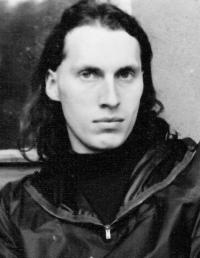We wanted to show the regime that we were insane and capable of anything
Miroslav Vodrážka was born on 13 September 1954 in Prague. He grew up in modest circumstances but nevertheless enjoyed a merry childhood. Already at young age he stood up to dominance and violence by men towards women. He even referred to himself in feminine gender. After finishing elementary school he had an idle year during which he polished his resistance towards normativity. In response to the rationalization of life under socialism he published an Emotionalism Manifesto in 1971. At the same time he became acquainted with the Jewish mystic Maxmilian Duren and leading Czechoslovak intellectuals such as Jiří Němec or Karol Sidon. He became interested in music and soon established his first underground band. In 1977 he painted Prague’s St. Wenceslas memorial with a statement for which he was interned at a psychiatric clinic for several months. There, he was exposed to insulin shock therapy. He hadn’t signed the Charter 77 as he considered it insufficiently radical and hypocritical in its demands. In spite of that, his Old Town apartment served as a meeting spot for Charter signatories and the secret police perceived him as one of them. He helped publish the samizdat magazine Vokno and organized house seminars with Egon Bondy, Milan Balabán and Michal Machovec. At the beginning of 1980s he was fired from a printing workshop and spent the following decade working as a boiler operator. For all of the normalization times he remained principally opposed to any compromise with the regime. Following the Velvet Revolutions he brought to the public debate issues related to feminism and transgender. At present he is an independent musician and journalist, still considering himself a man of the counter-culture. He works in the Institute for the Study of Totalitarian Regimes.



